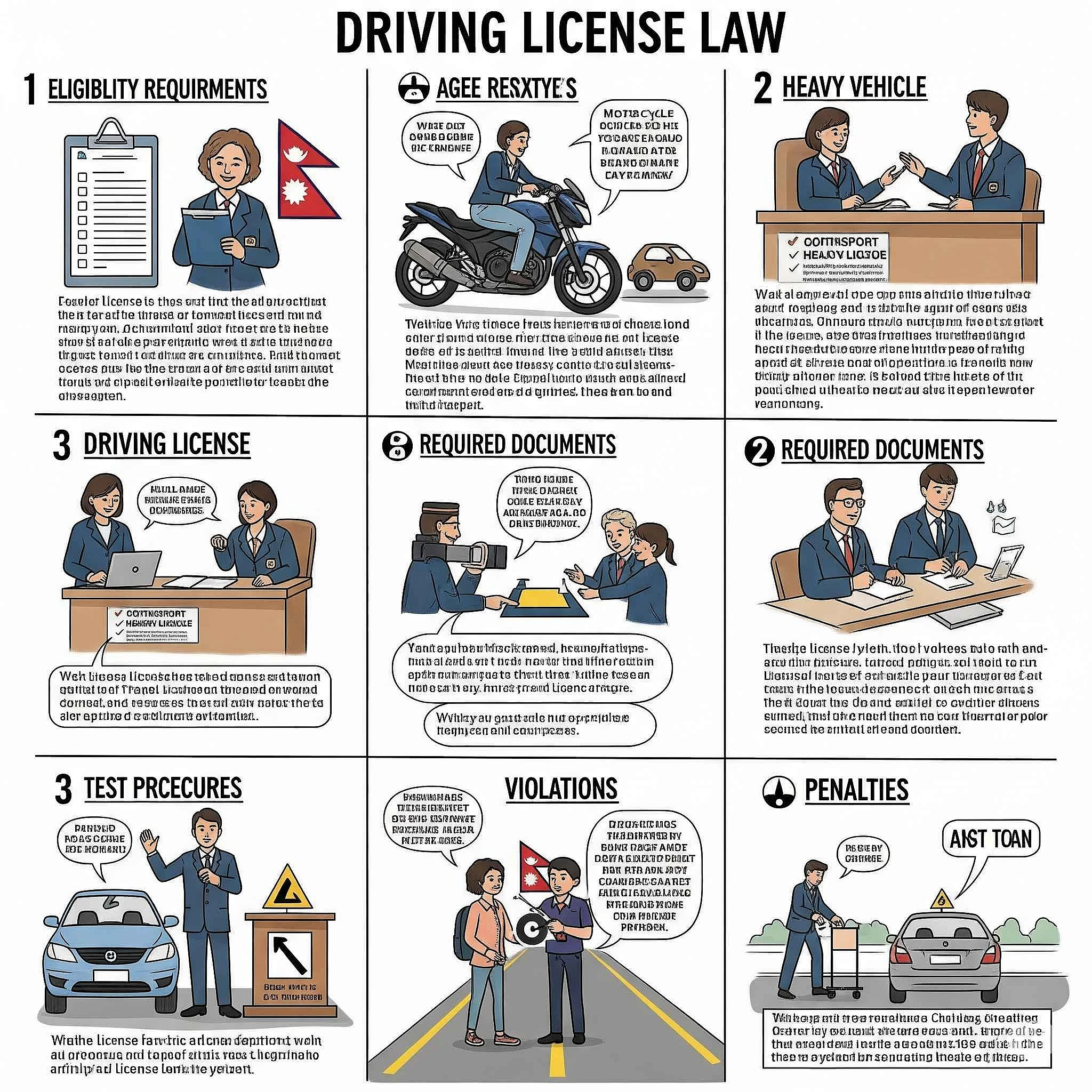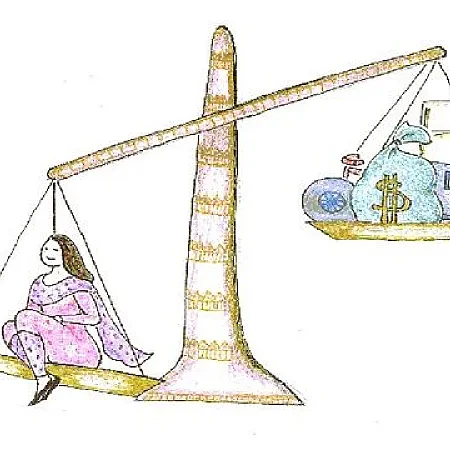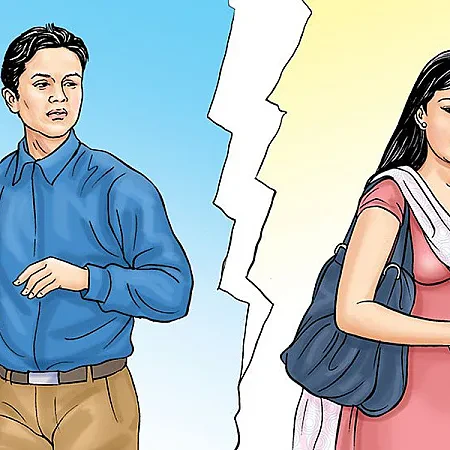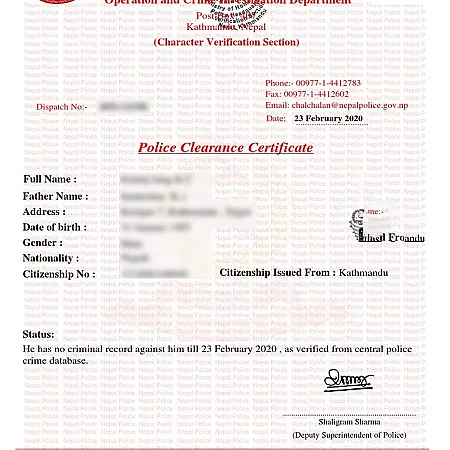Comprehensive Guide to Driving License Law in Nepal: Your Complete Legal Reference
Understanding Your Rights, Obligations, and Procedures Under Nepalese Law
Introduction
Driving in Nepal requires a valid driving license issued by the Department of Transport Management (DOTM) under the authority of the Motor Vehicle and Transport Management Act 2049 (1993). This comprehensive guide provides essential information about driving license regulations, requirements, and procedures that every driver in Nepal must understand to ensure legal compliance and road safety.
Legal Framework Governing Driving Licenses
Primary Legislation
The driving license system in Nepal is governed by the Motor Vehicle and Transport Management Act 2049 (1993) and its subsequent amendments, along with the Motor Vehicle and Transport Management Rules. These laws establish the legal foundation for vehicle registration, driving licenses, traffic regulations, and penalties.
Regulatory Authority
The Department of Transport Management (DOTM), operating under the Ministry of Physical Infrastructure and Transport, serves as the primary regulatory authority responsible for:
- Issuing and renewing driving licenses
- Conducting driving tests and examinations
- Maintaining driver records
- Implementing traffic safety policies
- Enforcing licensing regulations
Categories of Driving Licenses
Nepal's driving license system categorizes licenses based on vehicle types to ensure drivers have appropriate skills for specific vehicle categories.
License Categories
Category A/K - Two-Wheelers
- Motorcycles, scooters, and mopeds
- Minimum age requirement: 16 years (current regulation)
- Note: Proposed changes suggest increasing the minimum age to 18 years
Category B - Small Vehicles
- Cars, vans, jeeps, and light commercial vehicles
- Minimum age requirement: 18 years
Category C - Medium Vehicles
- Trucks, buses, and medium commercial vehicles
- Minimum age requirement: 21 years
Category D - Heavy Vehicles
- Large trucks, heavy commercial vehicles, and specialized equipment
- Minimum age requirement: 21 years
Professional Licenses
- Required for commercial drivers operating public transport
- Additional requirements including experience and specialized training
Application Requirements and Documentation
Essential Documentation
All applicants must provide the following documents:
Primary Documents:
- Citizenship certificate (original and photocopy)
- Birth certificate or documents verifying age
- Recent passport-size photographs
- Medical certificate from authorized medical practitioners
- Blood group certificate
Educational Requirements:
- Class 10 pass certificate (proposed as mandatory requirement)
- Literacy certificate for applicants without formal education
Additional Requirements for Specific Categories:
- Experience certificates for professional licenses
- Character certificate from local authorities
- No objection certificate from employers (for professional drivers)
Medical Certificate Requirements
Medical fitness is mandatory for all driving license applicants. The medical examination must verify:
- Visual acuity and color blindness testing
- Hearing capacity
- Physical fitness and mobility
- Mental health assessment
- Absence of epilepsy or other disqualifying conditions
- Blood pressure and cardiovascular health
Medical certificates must be issued by government-authorized medical practitioners and remain valid for six months from the date of issue.
Application Procedures
Online Application Process
Nepal has implemented an online driving license application system to streamline the process:
Step 1: Online Registration
- Visit the official DOTM website (applydlnew.dotm.gov.np)
- Create user account with valid email and mobile number
- Fill complete application form with accurate information
- Upload required documents in specified formats
Step 2: Document Verification
- Submit original documents at designated DOTM offices
- Verification of identity and eligibility
- Payment of prescribed fees
Step 3: Written Examination
- Computer-based test covering traffic rules and regulations
- Pass marks: typically 40 out of 60 questions
- Available in Nepali and English languages
Step 4: Practical Driving Test
- Demonstration of driving skills on designated test routes
- Assessment using the 70-point system
- Minimum 40 points required to pass
Fee Structure
License fees vary by category and are subject to periodic revision:
- Two-wheeler license: NPR 1,000-1,500
- Small vehicle license: NPR 1,500-2,000
- Heavy vehicle license: NPR 2,000-3,000
- Professional license: Additional fees apply
- International driving permit: Additional charges
Examination and Testing Process
Written Examination
The theoretical test evaluates knowledge of:
- Traffic rules and regulations
- Road signs and signals
- Vehicle safety requirements
- First aid and emergency procedures
- Environmental regulations
- Penalty provisions
Practical Driving Test
The practical examination uses a point-based system introduced by DOTM:
70-Point Assessment System:
- Starting points: 70
- Points deducted for errors and violations
- Minimum 40 points required to pass
- Common deductions include touching boundary lines, stalling, improper signaling
Test Components:
- Vehicle inspection and safety checks
- Starting and stopping procedures
- Parking and maneuvering
- Traffic rule compliance
- Emergency response
License Validity and Renewal
Current Validity Periods
Under existing regulations:
- General driving licenses: 5 years
- Professional licenses: 3 years
- International driving permits: 1 year
Proposed Changes
The Motor Vehicles and Transport Management Bill-2081 proposes significant changes:
- General driving licenses: 10 years validity
- Professional licenses: 5 years validity
- Enhanced renewal procedures with stricter requirements
Renewal Process
Standard Renewal Requirements:
- Valid medical certificate
- No outstanding traffic violations
- Payment of renewal fees
- Updated photographs
Grace Period:
- 90 days grace period after expiration
- Late renewal penalties apply
- License cancellation after 5 years of non-renewal
Penalties and Violations
Driving Without Valid License
First Offense:
- Fine: NPR 500-1,000
- Vehicle impoundment possible
- Mandatory court appearance
Repeat Offenses:
- Increased fines: NPR 1,000-5,000
- Possible imprisonment up to 3 months
- Vehicle confiscation
License Suspension and Revocation
Grounds for Suspension:
- Drunk driving convictions
- Reckless driving causing accidents
- Accumulation of traffic violation points
- Medical unfitness
Grounds for Revocation:
- Serious criminal convictions
- Fraudulent license applications
- Repeated serious traffic violations
- Permanent medical disqualification
Traffic Violation Point System
Nepal implements a point-based penalty system:
- Minor violations: 1-3 points
- Moderate violations: 4-6 points
- Serious violations: 7-10 points
- License suspension: 12+ points within 12 months
Recent Legal Updates and Proposed Changes
Motor Vehicles and Transport Management Bill-2081
Key proposed amendments include:
Age Limit Changes:
- Minimum age for two-wheelers: 18 years (increase from 16)
- Enhanced age verification procedures
- Mandatory educational qualifications
License Validity Extensions:
- General licenses: 10 years
- Professional licenses: 5 years
- Reduced renewal frequency
International Recognition:
- International driving permits for Nepali citizens
- Recognition of foreign licenses under international treaties
- Reciprocal agreements with other countries
Enhanced Safety Measures:
- Mandatory safety training programs
- Stricter medical examination requirements
- Criminal background checks for professional drivers
Digital License Initiative
Nepal is transitioning to smart card driving licenses featuring:
- Enhanced security features
- Digital verification capabilities
- Integration with national identity systems
- Reduced counterfeiting risks
Rights and Obligations of License Holders
Rights of Licensed Drivers
Legal Driving Authority:
- Right to operate vehicles within license category
- Protection against arbitrary license cancellation
- Appeal rights for license-related decisions
- Access to license renewal and modification services
Due Process Rights:
- Right to legal representation in violation proceedings
- Right to challenge penalty decisions
- Right to medical examination review
- Right to request license restoration
Obligations of License Holders
Compliance Requirements:
- Carry valid license while driving
- Maintain current address information
- Report license loss or theft immediately
- Comply with all traffic laws and regulations
Ongoing Responsibilities:
- Regular medical fitness maintenance
- Timely license renewal
- Notification of relevant legal proceedings
- Participation in mandatory training programs
Special Provisions and Exemptions
Diplomatic and Official Licenses
Special provisions apply to:
- Diplomatic personnel and families
- International organization staff
- Government officials on official duty
- Foreign technical experts
Learner's Permits
Temporary permits for learning purposes:
- Valid for 6 months
- Restricted to training with qualified instructors
- Supervision requirements
- Limited driving areas
Disabled Driver Accommodations
Special provisions for drivers with disabilities:
- Modified vehicle requirements
- Specialized testing procedures
- Accommodation in examination processes
- Regular medical reviews
Practical Guidance for Applicants
Pre-Application Preparation
Document Preparation:
- Gather all required documents well in advance
- Ensure all documents are current and valid
- Obtain certified translations if necessary
- Verify medical examination requirements
Study and Training:
- Study official traffic rules and regulations
- Practice driving with qualified instructors
- Take online practice tests
- Understand penalty provisions
Common Application Challenges
Document Issues:
- Incomplete or outdated documentation
- Medical certificate expiration
- Address verification problems
- Educational certificate requirements
Examination Difficulties:
- Language barriers in written tests
- Inadequate practical driving preparation
- Misunderstanding of testing procedures
- Point system confusion
Tips for Success
Written Examination:
- Study official DOTM materials thoroughly
- Practice with sample questions
- Understand road signs and signals
- Review penalty provisions
Practical Test:
- Practice on similar test routes
- Understand the 70-point system
- Focus on smooth driving techniques
- Maintain proper vehicle control
Conclusion
Understanding driving license law in Nepal is essential for all current and prospective drivers. The legal framework continues to evolve with proposed amendments aimed at improving road safety and modernizing the licensing system. Drivers must stay informed about current requirements, maintain compliance with renewal procedures, and understand their rights and obligations under the law.
The Department of Transport Management continues to modernize its services through digital initiatives and enhanced testing procedures. As Nepal moves toward stricter licensing requirements and longer validity periods, drivers must adapt to changing regulations while maintaining their commitment to road safety and legal compliance.
For the most current information about driving license requirements and procedures, always consult the official Department of Transport Management website or visit authorized DOTM offices. Legal requirements may change, and this guide should be supplemented with current official information for specific situations.
Education Consultancy Registration in Nepal
Disclaimer: This guide provides general information about driving license law in Nepal based on current regulations and proposed changes. For specific legal advice or complex situations, consult with qualified legal professionals familiar with Nepalese transportation law. Always verify current requirements with official DOTM sources before making applications or decisions.
Contact Information:
- Department of Transport Management: 014574921, 014574922
- Email: [email protected]
- Website: www.dotm.gov.np
- Online Application: applydlnew.dotm.gov.np




